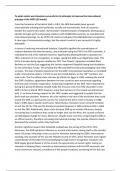To what extent was Honecker successful in his attempts to improve the international
prestige of the GDR? (20 marks)
From the formation of the Berlin Wall in 1961, the GDR had widely been ignored.
Internationally isolating itself politically, socially and economically, from all countries
besides the eastern bloc states. By Honecker’s implementation of Ostpolitik, developing an
identity through sports and growing relations with COMECON countries, he manufactured
international prestige. So, by 1978 123 countries had given the GDR diplomatic recognition.
A clear sign of international prestige, but the extent to which it was successful is highly
debatable.
In terms of reducing international isolation, Ostpolitik signified the normalisation of
relations between the two Germany’s, due to Brandt being the FRG’s first SPD chancellor, it
indicated the end of the Hallstein Doctrine. Significantly allowing Brandt to abandon the
FRG’s insistence of non-recognition, no longer seeing the GDR as an illegitimate state. This
led to 4 treaties being signed, notably the 1971 Four Powers’ Agreement enabled West
Berliners to visit the East suggesting the Soviets supported Ostpolitik laying the foundation
for the 1972 Basic Treaty. This entailed the FRG and GDR formally acknowledging each other
as states. This was of pivotal importance for the GDR’s international reputation as it enabled
trade, international politics, in 1973 to join the United Nations as the 133rd member, and
state visits. The first official state visit was by Ulbricht to Egypt in 1965, marking the end of
the GDR’s isolation, agreements between the two countries were announced regarding
technical and economic cooperation, furthering recognition of the GDR. More importantly,
during this period of détente, Brandt made the first ever visit of an FRG chancellor to the
GDR in Erfurt in March 1970. However, many East Germans in the crowds carried banners
with ‘y’ on them showing support for the FRG’s leader and suggested to people that the
Berlin wall was obsolete. However, this visit implied to the rest of the world that they could
accept the GDR as a permanent country, for instance this led to visits to Austria in 1980,
Italy in 1985, Spain, Sweden and France. Nevertheless, Honecker never received invitation
to visit the UK nor USA and the Soviets prevented Honecker in 1981 and then Kohl in 1983
to visit the FRG. Additionally, these visits did open GDR up to outside influences, despite
increasing Stasi surveillance they could no longer shut out the West, this caused confusion
and ideological change for many. Moreover, despite many countries recognising the GDR as
an official country, therefore increasing international prestige, the outside influence slowly
destroyed the socialist system they had built.
Another significant aspect that Ostpolitik enabled was the joining of the UN in 1973.
Moreover, the GDR had direct influence on accords and treaties, seeing itself as the socialist
heart of Europe, reflecting a clear success for Honecker bolstering the GDR’s international
standing. One example of this was the Helsinki Accord of 1975, which Honecker even signed
seated beside US President Ford exemplifying the high level of recognition. However, the
GDR largely ignored basket 3 of this accord, the agreements on human rights, having no
intention of keeping them, ironically as international relations with the FRG increased, and
travel restrictions reduced, surveillance of the people increased, worsening life for the East




